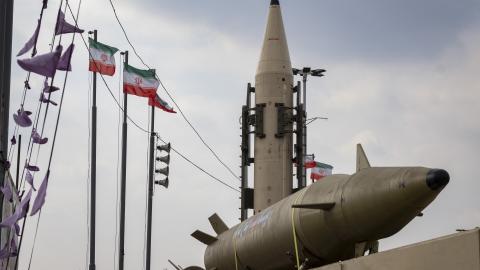President Bush may be on his way to alienating a large portion of his base: evangelical Christians. The issue is not gay rights or abortion or the other items usually thought to be of concern to religious conservatives; it is U.S. policy on Sudan. The reason is that the State Department seems once more convinced that the proper way to deal with murderers and their victims is to somehow to be an honest broker between them.
Over the last 15 years, the Sudanese government has brought together extremist Sunnis and Shiites; turned itself into international-terrorism central; harbored bin Laden; promoted slavery (bin Laden has probably owned African slaves); imposed a reactionary version of Islamic law that includes crucifixion, stoning to death of mothers who are out of wedlock, and "cross amputation" (removing the hand and foot from opposite sides of the body); waged what the U.S. House of Representatives has called a "genocidal" war on its southern, largely Christian and animist population; promoted forced conversion to its brand of Islam; strafed refugees with helicopter gunships; and manipulated food relief as a weapon, resulting in the death of over two million people — more than in Rwanda, Bosnia, Kosovo, Cote D'Ivoire, and Liberia combined. It has also produced four million displaced people, the largest such population on the face of the earth.
As usual, the U.N. and the rest of the world ignored this. It was only when a coalition of Americans campaigned to get the U.S. government to act that things began to change. That coalition was and is broad, combining African Americans, Episcopalians, Catholics, anti-slavery activists, and liberals opposed to genocide no matter who the victims. Most of its grassroots, though, are conservative Christians — so much so that the New York Times referred to it as their "pet" project (would another group combating genocide be sneeringly be labeled as having some pet peeve?).
Domestic U.S. political pressure, combined with Sudan's post-9/11 fear that America might now get serious, has led to a cease-fire and American-brokered peace talks. Under the terms of the U.S.'s Sudan Peace Act, the American government is applying pressure on the Sudanese government (called the National Islamic Front and — like Hamas, its better known brother — an offshoot of Egypt's Muslim Brotherhood) and the Sudan Peoples Liberation Movement to conclude a just peace accord.
During this period of negotiations, the Sudanese regime has engaged in multiple violations of its ceasefire agreements. In the south, its allied militias have accelerated scorched-earth military campaigns, particularly in the oil-rich Upper Nile Province.
It has also used the breathing space in the south to launch a war against largely Muslim black Africans in Darfur, in the west of the country — arming and assisting Arab militias in what the U.N. coordinator for Sudan, Mukesh Kapila, calls "an organized campaign to rid an area of a group of people." Government-backed militias are engaged in systematic rape and murder. In recent months, more than 10,000 people have been killed, 110,000 have fled to neighboring Chad, and 670,000 are internally displaced, having been forced to flee their villages. Even Kofi Annan has voiced concern, and both President Bush and Secretary of State Colin Powell have used their bully pulpit to unequivocally condemn Khartoum's atrocities.
The last negotiating point with the south is the status of Sharia, or Islamic law, in Sudan. Khartoum is bent on imposing its extremist version of Islam on all people in the areas it controls. That means everyone in the north, Muslim or non-Muslim, and anybody from the south who enters the capital city of Khartoum. This position is particularly egregious since it was the regime's enforcement of its brand of sharia 21 years ago that led to war in the first place.
Apart from other barbarities, if it is allowed to do this, non-Muslims will not be permitted to serve as judges or lawyers in the courts to which they are subject. Their testimony will be given only half the weight of a Muslim's (or, if a woman, one quarter the weight given to a Muslim male). As in Pakistan, a Christian could be sentenced to death for blasphemy based on the unsupported testimony of one Muslim. They cannot exercise any authority over a Muslim — which will, to say the least, put southern members of the government, under a proposed power-sharing agreement, in a very peculiar situation.
How can we expect southern Sudanese, who have been persecuted, enslaved, starved, and killed outright for over 20 years — fighting against the Islamization and Arabization of their country — to now give in to Khartoum and "submit" to Islamic law?
The U.S. government should not be in the business of forcing non-Muslims — or Muslims for that matter — to submit to the very type of regime that al Qaeda advocates. In order to get the issue off the table and move on, however, some State Department personnel at the peace talks appear to be pressuring the south (some of our strongest supporters in the war on terror) to accept this farrago. Apart from its other problems, then, this is a major hindrance to the War on Terror. It is now crystal clear that states and regions that implement reactionary, Wahabi-like versions of Islamic law view the West as infidels and enemies; are undemocratic and brutal; produce domestic terrorists; and nearly always produce international terrorists. While we try to prevent failed states elsewhere, we may be about to create the conditions for one in Sudan.
President Bush has built up enormous goodwill on this issue — not least because it was his personal interest, commitment, and intervention that got the U.S. moving to achieve a just peace in Sudan. But the State Department bureaucracy is in danger of squandering it. If it does so, the administration will have accomplished an unusual trifecta: undercutting the war on terror; signaling that America is harder on its friends than on its enemies; and damaging the president politically. He needs to rein in and put some spine into America's diplomats in Sudan — before it is too late.














